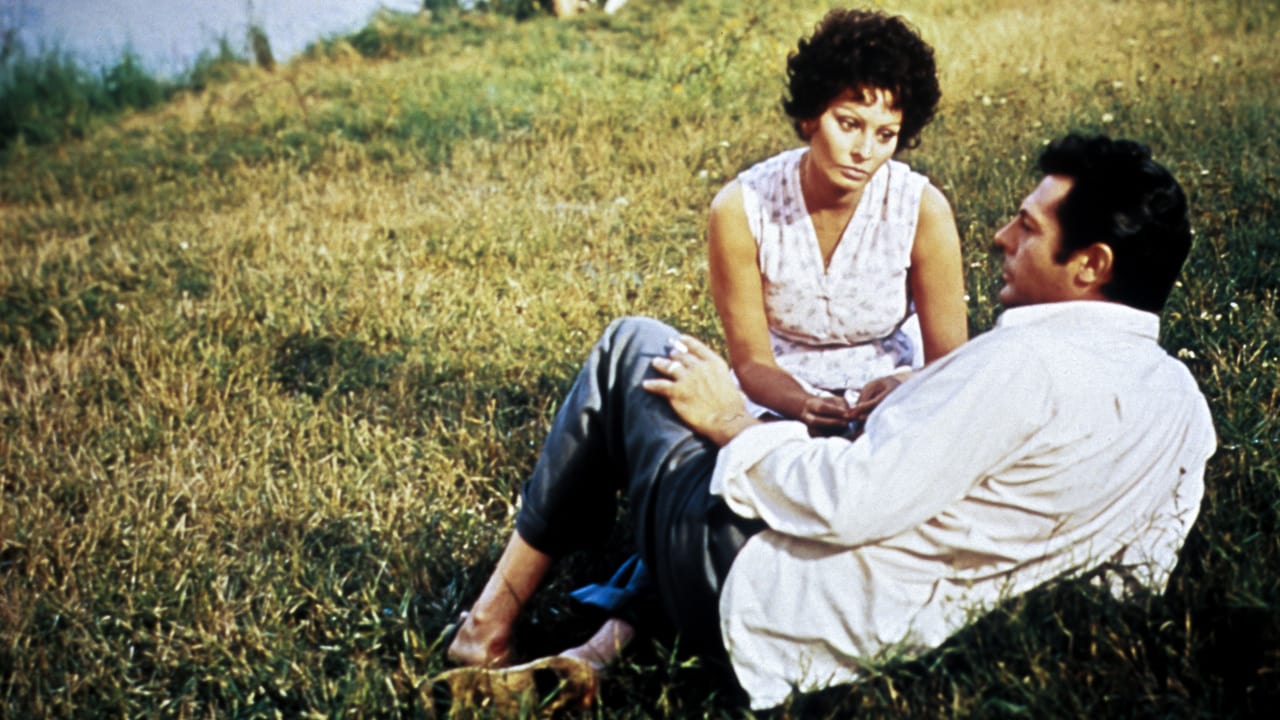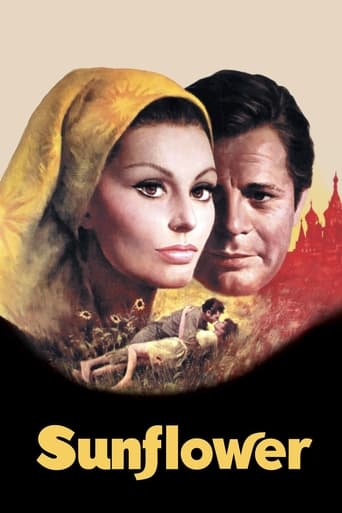



Nice effects though.
This is one of the few movies I've ever seen where the whole audience broke into spontaneous, loud applause a third of the way in.
View MoreEach character in this movie — down to the smallest one — is an individual rather than a type, prone to spontaneous changes of mood and sometimes amusing outbursts of pettiness or ill humor.
View MoreIt is interesting even when nothing much happens, which is for most of its 3-hour running time. Read full review
View MoreAlthough not the most interesting story (in the script and direction), told by maestro Vittorio De Sica, "I girasoli" has singular moments of visual poetry, interpretation, sound and indisputably of De Sica's ability to record and transmute the simplicities of life.I remember the first films that I watched this, that is, a great inspiration and to those who always devote an absolute favoritism. Vittorio De Sica through the possibilities of presenting and not representing life, as the Italian neo-realist movement wished, giving rise to films that were very close to a documentary record and fascinated by their seam in reverse, without modesty to show the volatile frenzy of a Country and its people, in the face of the new relations that emerge, and in the uncertainty of their durability.Certainly a cultural movement can not be tied to a creator, on the contrary, it must be a device for new constructions, and this is notorious in "I girasoli". Produced in 1970, with a script by Cesare Zavattini and an argument elaborated by Tonino Guerra, famous poet, writer and chronicler of the war. Being an Italo-Franco-Soviet co-production, this allowed for a rare record of the former Communist bloc, in part because of De Sica's good relations with the Italian Communist Party.In the form of an ultra simplistic summary, I would like to say, "I girasoli" is the portrait of a brief happiness in the face of the non-amorous concreteness ruled by the adversities of war and reasons not always surrounded by logical meaning or possible to name. The film succeeds as a moving family drama, and microcosm of the social history of Italy during the 1940s (war period) until the early 1970s.The weight of the commercial influence causes losses notorious for the film, in which its plot is constructed through moorings that seek to structure and punctuate the trajectory of the personages to the molds of the melodramatic structure of the films Hollywood of that time, disfiguring the original character of drama that the film proposes And the crisis relations of the drama, always prosperous element in the hands of the director De Sica. This disfigurement may be noted, for example, in the long and unnecessary record of Masha (Lyudmila Savelyeva) revealing to Giovanna (Sophia Loren) how she found and how she rescued Antonio (Marcello Mastroianni) from the cold and the war. A resource, I think, to further punctuate the melodrama of the story and to even more balance the audience in their love and final end crowd with whom Antonio should stay? The beloved woman or the woman who saved you?There are several moments in the film that result in the same sense, to prolong the melodrama, to balance the decisions of the public and to exhibit explanations, something that makes the film exhausting, explanatory in excess and shallow before the dimension of human questions and the possibilities of social, Political and war-related issues that end up being used only as a background, and which, when evoked, are treated superficially.A highlight and deserves special attention is the relationship established by the protagonists Giovanna (Sophia Loren) and Antonio (Marcello Mastroianni). De Sica had done some work, with Sophia and Antonio as a couple of protagonists, (example: Ieri, oggi, domani -1963). This previous experience, collaborates both for those who have already attended or for those who witness for the first time the partnership between such actors and the director. This total chemistry, ease and intimacy for the game, collaborate exactly, where it does not take more than three minutes, for the public to twist and "ship" the couple Giovanna and Antonio. Something very important and necessary for this story, since the happiness between these two is brief. Just as in a football match, the audience vibrates with the determined, passionate posture of Giovanna - an Italian woman - who goes to Russia to look for Antonio, the husband given as lost during World War II. The crossing is made by urban landscapes and fields of sunflowers, a beautiful, flowery and poetic passage that collaborate in the perspective of a happy ending.The work of Sophia Loren is hard in the attempt to disengage from the muse and sexual appeal common to the history of her characters, and in many moments succeed, but to facilitate the outcome of its history, we have precisely the use of the muse and the sexual appeal, But clearly as a resource imposed by the script and accepted by the management. Already Marcello Mastroianni impresses by charisma and magnetism, a simple portrait of the actor or character are enough. We honestly know that it is not at all a difficult job for both actors, since the characters do not require during the feat, during what is filmed or captured, a scattering of states, feelings and conflicts. The melodramatic load is already in charge of this, but at no time do we see a minor work, a corner job, or a lack of prestige.Highlights for the track of Henry Mancini, famous for creating musical identity in the films in which he works. Giuseppe Rotunno's Photography, especially in all the scenes of crowd, that added to the direction of Vitoria print a true picture of an Italy. Among so many moments of brilliance of direction and photography, I highlight the first scene of war in Russia. The strong and fruitful image of a large red flag swaying in the air and oscillating between projections, background and transparencies of a war in the snow that is stained by the blood of people as lost as the fate of two homelands that oscillate between the mother And the hangman, an opposition who, at the same time, embraces and sentences the life of the citizen (common man), and the soldier of war.
View MoreAs someone has pointed out the quality of the print on DVD is dire, truly washed out something like third or fourth generation, but even that can't dim the lustre of this truly fine movie which, unacountably, was blasted by the critics on its release. Okay, it is fair-to-maudlin but so what, it has a great central performance by Sophia Loren that puts her up there with Garbo, Davis, Crawford, both Hepburns and that is THE pantheon if anybody asks you. One can only imagine how ravishing some of the scenes would look in anything even approaching the true colour in which they were shot and Hank Mancini lays a great theme on us which resounds even more for lack of a lyric. If it really was De Sica's swan song it's a real trumpeter swan.
View More"I Girasoli" is certainly one of the best romantic stories in an honest and pure setting in Italy and Russia. It is a dramatic love story of Antonio and Giovana wanting to stay together in the war. The impossibility to hold on to the newly found and sweetest happiness becomes inevitable in the destructive war, where Anoinio is found half frozen by a Russian woman. The accent lies in finding love in warm sunny Italy and loosing this in the freezing cold war thousands of miles away. Although in this new other world there is love too, it is never the same as before. At the end the search for the lost love is completed and in vain when life has changed there lives irreversibly. Un impossibile ritorno al passato.
View MoreThere are few scenes more moving or more powerful than the scene where Sophia meets her husband in Russia.The scene is at a train station: he's on the arriving train and she's waiting on the platform. A huge number of people get off the train and she's looking at everyone through the chaos of moving bodies. She doesn't really expect to find him, but hope is still alive.She sees him through the throng, he sees her.The wordless communication between them as she gets on the train to leave and he stays on the platform watching her go is nothing less than thrilling. It's a great cinematic moment - a great moment of acting for Loren.It is, perhaps, the single scene for which I shall always remember her.
View More